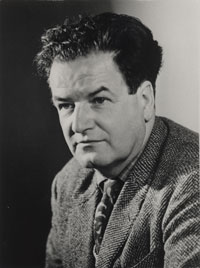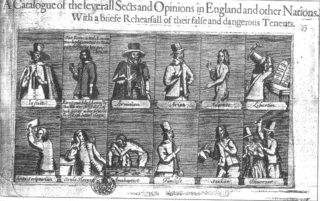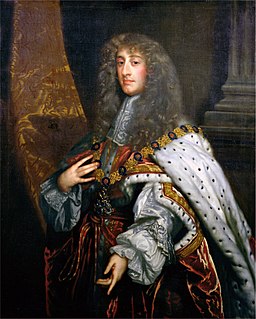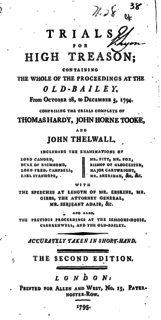
England is a country that is part of the United Kingdom. It shares land borders with Wales to the west and Scotland to the north. The Irish Sea lies west of England and the Celtic Sea to the southwest. England is separated from continental Europe by the North Sea to the east and the English Channel to the south. The country covers five-eighths of the island of Great Britain, which lies in the North Atlantic, and includes over 100 smaller islands, such as the Isles of Scilly and the Isle of Wight. It is the largest country of British Isles.

The English Civil War (1642–1651) was a series of civil wars and political machinations between Parliamentarians ("Roundheads") and Royalists ("Cavaliers") principally over the manner of England's governance. The first (1642–1646) and second (1648–1649) wars pitted the supporters of King Charles I against the supporters of the Long Parliament, while the third (1649–1651) saw fighting between supporters of King Charles II and supporters of the Rump Parliament. The war ended with Parliamentarian victory at the Battle of Worcester on 3 September 1651.
A Jacobin was a member of the Jacobin Club, a revolutionary political movement that was the most famous political club during the French Revolution (1789–99). The club was so called because of the Dominican convent in Paris in the Rue Saint-Jacques where they originally met.

Oliver Cromwell was an English military and political leader. He served as Lord Protector of the Commonwealth of England, Scotland, and Ireland "and of the dominions thereto belonging" from 1653 until his death, acting simultaneously as head of state and head of government of the new republic.

The Levellers were a political movement during the English Civil War (1642–1651) committed to popular sovereignty, extended suffrage, equality before the law and religious tolerance. The hallmark of Leveller thought was its populism, as shown by its emphasis on equal natural rights, and their practice of reaching the public through pamphlets, petitions and vocal appeals to the crowd.
Right-wing politics holds that certain social orders and hierarchies are inevitable, natural, normal, or desirable, typically supporting this position on the basis of natural law, economics, or tradition. Hierarchy and inequality may be viewed as natural results of traditional social differences or the competition in market economies. The term right-wing can generally refer to "the conservative or reactionary section of a political party or system".

John Wilkes was a British radical, journalist and politician. He was first elected a Member of Parliament in 1757. In the Middlesex election dispute, he fought for the right of his voters—rather than the House of Commons—to determine their representatives. In 1768, angry protests of his supporters were suppressed in the St George's Fields Massacre. In 1771, he was instrumental in obliging the government to concede the right of printers to publish verbatim accounts of parliamentary debates. In 1776, he introduced the first bill for parliamentary reform in the British Parliament.

John Edward Christopher Hill was an English Marxist historian and academic, specialising in 17th-century English history. From 1965 to 1978, he was Master of Balliol College, Oxford University.

The Seekers, or Legatine-Arians as they were sometimes known, were an English Protestant dissenting group that emerged around the 1620s, probably inspired by the preaching of three brothers – Walter, Thomas, and Bartholomew Legate. Seekers considered all organised churches of their day corrupt and preferred to wait for God's revelation. Many of them subsequently joined the Religious Society of Friends (Quakers).

The Diggers were a group of Protestant radicals in England, sometimes seen as forerunners of modern anarchism, and also associated with agrarian socialism and Georgism. Gerrard Winstanley's followers were known as True Levellers in 1649 and later became known as Diggers, because of their attempts to farm on common land.

The Parliament of Great Britain was formed in 1707 following the ratification of the Acts of Union by both the Parliament of England and the Parliament of Scotland. The Acts created a new unified Kingdom of Great Britain and dissolved the separate English and Scottish parliaments in favour of a single parliament, located in the former home of the English parliament in the Palace of Westminster, near the City of London. This lasted nearly a century, until the Acts of Union 1800 merged the separate British and Irish Parliaments into a single Parliament of the United Kingdom with effect from 1 January 1801.
The Society of the Friends of the People was an organisation in Great Britain that was focused on advocating for Parliamentary Reform. It was founded by the Whig Party in 1792.

The Wars of the Three Kingdoms, sometimes known as the British Civil Wars, formed an intertwined series of conflicts that took place in the kingdoms of England, Scotland and Ireland between 1639 and 1651. The English Civil War proper has become the best-known of these conflicts; it included the abolition of the monarchy and the execution of the kingdoms' monarch, Charles I, by the English Parliament in 1649.
The term "Radical", during the late 18th and early 19th centuries, identified proponents of democratic reform, in what subsequently became the parliamentary Radical Movement.

John Thelwall was a radical British orator, writer, political reformer, journalist, poet, elocutionist and speech therapist.

James II and VII was King of England and Ireland as James II and King of Scotland as James VII, from 6 February 1685 until he was deposed in the Glorious Revolution of 1688. The last Roman Catholic monarch of England, Scotland and Ireland, his reign is now remembered primarily for struggles over religious tolerance. However, it also involved the principles of absolutism and divine right of kings and his deposition ended a century of political and civil strife by confirming the primacy of Parliament over the Crown.
Jonathan Irvine Israel is a British writer and academic specialising in Dutch history, the Age of Enlightenment and European Jews. Israel was appointed as Andrew W. Mellon Professor in the School of Historical Studies at the Institute for Advanced Study, Princeton, New Jersey, in January 2001. He was previously Professor of Dutch History and Institutions at the University College London.

The 1794 Treason Trials, arranged by the administration of William Pitt, were intended to cripple the British radical movement of the 1790s. Over thirty radicals were initially arrested; three were tried for high treason: Thomas Hardy, John Horne Tooke and John Thelwall. In a repudiation of the government's policies, they were acquitted by three separate juries in November 1794 to great public rejoicing. The treason trials were an extension of the sedition trials of 1792 and 1793 against parliamentary reformers in both England and Scotland.
Richard Coppin was a seventeenth-century English political and religious writer, and prolific radical pamphleteer and preacher.

The Condition of the Working Class in England is an 1845 book by the German philosopher Friedrich Engels, a study of the industrial working class in Victorian England. Engels' first book, it was originally written in German as Die Lage der arbeitenden Klasse in England; an English translation was published in 1885. It was written during Engels' 1842–44 stay in Manchester, the city at the heart of the Industrial Revolution, and compiled from Engels' own observations and detailed contemporary reports.













